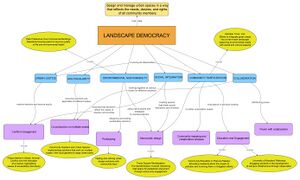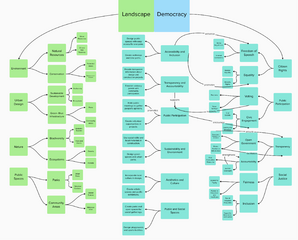Democratic Landscape Transformation 2024 - Team 12
>>> Back to working group overview
>>> Back to seminar reading list
>>> go to the Editing Help
Background of your team
Please present your team briefly. Which linguistic and cultural perspectives does each member bring in? Which disciplinary backgrounds are present in your team?
- Lucia Petronio: I'm a Building Engineering and Architecture student from University of Bologna (Italy), currently attending my last year of classes. I'm very interested in all the studies involving adaptation to climate change, mitigation of the bad influences of human actions and sustainable innovations in terms of architectural and participatory project. I'm now about to start my graduation thesis in urban planning, deepening the research in the theme of Renewable Energy Communities (RECs) as a mean leading to a more sustainable lifestyle in cities.
- Kelly Rasmussen:
- Ujvári Orsi: Hello! I'm a Horticultural student in Hungary and this is currently my first year studying at a Uni. I really enjoy spending time with building, and planning new aerias like parks, and other buildings, but mainly focusing on the plants, as my passion is in bringing the nature closer to everyone.
- Yasmeen Abdel Rahman:
- Sepide Arabi: I am an Iranian architect currently pursuing my master's degree in Landscape Architecture at IMLA, where my studies focus on sustainable design. With a background in architecture from Iran, I bring a deep understanding of cultural and environmental contexts to my work. I am fluent in Persian and English which enhances my ability to collaborate internationally.
Your Landscape Democracy Manifestoes
Here you can add links to the manifestoes you have presented on April 24. Please make sure that the links are accessible. You can also add them directly here on the wiki, they need to be png or jpg format then.
- Lucia Petronio: https://cryptpad.fr/file/#/2/file/GFrYDk+IOXgvldZwiqTk2936/
- Kelly Rasmussen: https://drive.google.com/file/d/1Xk33v2ButjKDrQAFzFdR8QzZpFiJ1Zrq/view?usp=sharing
- Ujvári Orsi: https://cryptpad.fr/pad/#/2/pad/view/+-pY5db8iDuyPwTJ18Vx+OrVlSm938lbnGlp7aeHf9U/
- Yasmeen Abdel Rahman: https://docs.google.com/document/d/1K3B7BBf8Pgz8kT3O7nAd3X13j3b1PKYabSzH9hsNKt0/edit?usp=sharing
- Sepide Arabi: https://www.canva.com/design/DAGDVEczmUc/lHgl5UhW8EHYRhpqT034qA/view?utm_content=DAGDVEczmUc&utm_campaign=designshare&utm_medium=link&utm_source=viewer
Readings, concepts and definitions
- Start: April 3, 2024
- Due: July 2, 2024
While working in your group, please start to express your personal understanding of the relation of landscape and democracy in the form of a concept map with linking words or any other diagrammatic representation. Please make your maps very visual and not just verbal. Think critically about why one map differs from another.
The final product is a shared concept map that integrates the various understandings present within your team.
About concept mapping
Before starting the exercise you can read this article by Joseph D. Novak & Alberto J. Cañas about Theory Underlying Concept Maps and How to Construct and Use Them. This paper gives a good explanation of how concept maps are conceived and developed.
You can use any tool you like for producing your concept map. However, since the result needs to be submitted digitally we recommend the following open source software for producing your maps:
- Cmap Tools >>> you can also work with your group on the Cmap cloud doing a shared map
- VUE - The Visual Understanding Environment
- Use a shared whiteboard to develop your integrated concept map, such as MIRO or MURAL
How to present your concept maps
- Possible format: JPG (for wiki upload) or link to any other resource
- We give you below a draft image gallery where you can add pictures of your map (in JPG or PNG format)
- You can present your integrated understanding as one concept map or your present individual ones and the integrated one.
- add as many additional materials as you need
Overview of your concept maps (individiual and integrated)
Please finish with a short reflection
- What are the similarities and differences in your team regarding your understanding of what democratic landscape transformation is? All team members emphasize the importance of community involvement in the decision-making process. There is a shared belief that democratic landscape transformation requires sustained community engagement, transparency, and observation throughout the design and development process. Additionally, each manifesto highlights the need to balance environmental sustainability with the needs and desires of the community, aiming to create spaces that serve both ecological requirements and social aspirations. The team also recognizes the presence of conflicts in urban planning and the necessity of resolving these through democratic means. On the other hand, each team member focuses on specific issues within the broader theme of democratic landscape transformation. The examples and contexts provided vary significantly, reflecting diverse geographical and cultural backgrounds—from the Po Valley's environmental concerns to the cultural and logistical challenges of market relocation in Amman and the socio-cultural landscape of Ekbatan Town in Iran.
- In how far did the seminar lectures and readings help you to clarify this? The seminar lectures and readings provided a comprehensive framework of key concepts. They emphasized the importance of community involvement, environmental sustainability, and conflict resolution, which are common themes in our manifestos. Additionally, the seminars introduced various approaches to collaboration, co-production, and prototyping, which highlighted the diverse methods and focal points each team member brought to the discussion, enriching our collective understanding.
- What will you take home from this seminar? We will take home the understanding that effective landscape transformation relies on active community involvement and collaboration. The course emphasized balancing environmental design with civic engagement, equitable power distribution, and practical tools like community mapping and prototyping.

